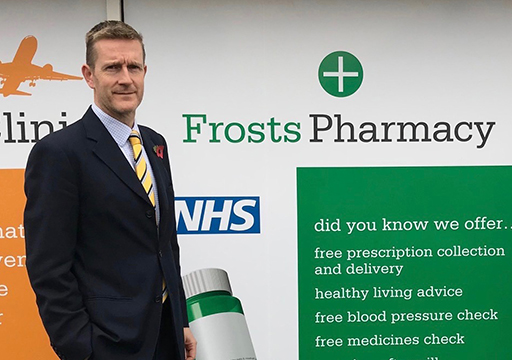10 things about... Taking pharmacy online
In Interviews
Follow this topic
Bookmark
Record learning outcomes
There are pros and cons of running an internet pharmacy, as well as some unexpected things that you might not have thought of…

In our instant-access world where we can order so many things we want at the click of a button, some patients will expect the same level of convenient access to healthcare. Online pharmacy can meet this need, but there are challenges and caveats for businesses to be mindful of.
1. Online activity
More people than ever are shopping online. The Office for National Statistics estimates around 90 per cent of households in Great Britain had internet access in 2017, and the proportion of adults using the internet to make a purchase increased to 77 per cent, up from 53 per cent in 2008. When it comes to healthcare, McKinsey’s 2014 Digital Patient Survey found 75 per cent of patients in the UK expected to use digital services in the future.
2. Ask the internet
An increasing number of people use the internet to search for health-related information, with a recent study suggesting one in five of us look online for answers to our health problems. Push Doctor’s UK Digital Health Review found 21.8 per cent of us are more likely to Google our symptoms before asking for advice from family, friends or a health professional.
3. Government stance
In the policy document ‘A Better Deal For Families And Firms’, government said it wanted patients to have access to more online and click-and-collect pharmacy services in an attempt to save the NHS money and to “save time for working people.”
4. The prescription market
A couple of years later and things had moved on. When asked how they use technology to manage their healthcare, respondents to Push Doctor’s 2016 survey revealed common tasks were ordering repeat prescriptions (29 per cent), contacting an online doctor (23 per cent) and buying nonprescription medication (15 per cent) or a prescription medicine (seven per cent).
5. Not just younger people
Actually, more than 70 per cent of UK patients over 50 say they want to use digital healthcare services.
6. Distance-selling distinction
The official definition for an online pharmacy is a ‘distance-selling’ pharmacy, because the regulations require there to be no face-to-face contact between patients and pharmacy staff on, or in the vicinity of, the premises for the delivery of Essential services. Patients are, however, allowed to access the pharmacy for non-essential services. So, for example, a patient can receive an MUR but not present a prescription at the same time.
7. Rules and regulations
As with other pharmacies, internet pharmacies must be registered with the GPhC and meet all of its standards.
8. Online pharmacy premises
Internet pharmacies wanting an NHS dispensing contract need only to prove they will comply with distance-selling rules. Any type of premises can be used – residential, retail, office or warehouse – as long as the local council and the GPhC approves.
9. Reassuring patients
The GPhC operates a voluntary internet pharmacy logo scheme to reassure patients that they are purchasing medicines online from registered pharmacies. Online pharmacies must be registered with the MHRA and display the EU common logo on every page of their website offering medicines for sale.
10. Top players
A Google search for ‘online pharmacy UK’ (currently) lists the top 10 (non-advert) as:
Superdrug’s Online Doctor & Pharmacy Service
LloydsPharmacy Online Doctor UK
Online in Oxford
Google ‘online pharmacy UK’ and top of the list is Oxford Online Pharmacy, part of the Frosts Pharmacy group. As well as the supply of medicines Oxford Online Pharmacy offers an Online Doctor service for consultations over the web, sexual health tests and a pharmacist available to give advice.
 “We saw a marketplace and an opportunity to take our independent pharmacy values and deliver them online”, says Stuart Gale, explaining the decision to branch out into online pharmacy in 2012, “but when we started we really didn’t know that much about it”. One surprise was how expensive it is to work with Google. “You need to understand Google and be prepared to pay to be found”, he says.
“We saw a marketplace and an opportunity to take our independent pharmacy values and deliver them online”, says Stuart Gale, explaining the decision to branch out into online pharmacy in 2012, “but when we started we really didn’t know that much about it”. One surprise was how expensive it is to work with Google. “You need to understand Google and be prepared to pay to be found”, he says.
Other challenges include a CQC inspection last year, which Stuart says came “five weeks before the CQC released their new standards. We were one of the first online pharmacies to be inspected, and it revealed a couple of areas where we needed to improve, but I definitely believe that the CQC inspecting is the right thing to do.”
Customer feedback has been positive, he says. “Customers tell us they really like the service because, more often than not, they can’t get in to see their doctor and get a prescription so they just want to get treated”. And his advice for making the leap online: “It’s great to be able to compete as an independent and know we can do something nationally, but the regulation and expense mean it’s not for the fainthearted.”
